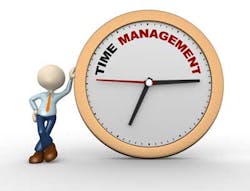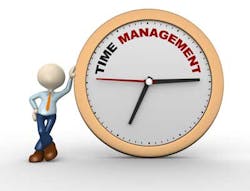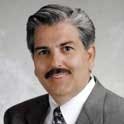Top 10 ways for effective time management for the dental executive
Photo credit: Dreamstime.com
1. Have a planning system.
The first step in effective time management for the dental executive is to choose a personal planning system. In today's world, we have multiple choices to assist us in our planning activities. Including Palm pilots, Franklin planners, and our own systems. Most planning systems as a minimum must include a daily or weekly calendar and the ability to record daily and master tasks. Whichever planning system you choose to use must be convenient and easy to carry. You must find something that works for you. There is no universal system that works well for everyone. A planning system you choose should be convenient in size in order to carry with you virtually everywhere you go. You must develop a habit of keeping your planning system up to date on a daily basis, adding tasks as necessary and noting which are completed.
ALSO BY THEODORE C. SCHUMANN, CPA, CFP |10 daily practice statistics every dentist should review
2. Set goals and plan backward.
Another effective tool in the personal organization and time management arena is setting written goals. One way I have found to improve the chances of achieving a goal is to plan backward. Starting at the goal you wish to accomplish and moving backward through the task will help you see the big picture. Most of us plan forward, and this works well for short-term projects. However, it isn't as effective when dealing with long-term projects. According to time management experts, planning backward focuses on results and provides you the structure you need to get things done in the right order at the right time.
ALSO BY THEODORE C. SCHUMANN, CPA, CFP | 10 steps to creating a vision for your dental practice
3. Prioritize.
In my mind, perhaps the hardest thing of task or time management is assigning priority to the task at hand. It's not uncommon for me to have up to 20 top priorities at any given time. You must take the time to review the task you have at hand and determine what level of priority this task takes — especially given the fact that your day is filled with treating patients and you will have a very limited time to address these issues. Most time management books I have read suggest an ABC type of prioritization. In order for this to work well, you must have clear values and goals. It is a good idea to record your priorities and your plans in your organizer, so that you can always have them with you. Do not plan too tightly and be realistic as to the time it would take for you to complete the task. It's a good idea to schedule the unpleasant task early in the day. To assign ample time necessary to complete the task, it's a good idea to inflate the time you think it will take by about 25%.
4. Use a daily quiet time.
One of the most effective things you can do to manage your task is to set aside somewhere between a half-hour and an hour each day as quiet time for you to approach the nonclinical task you must accomplish each day. Many dentists find it difficult to give up this much time of their productive schedule. Most dentists, though, find that if they regularly do this, times of being overwhelmed by administrative tasks will be limited and production will actually increase. It's important to remember that you must take time each day to work on your business in addition to working in your business.
5. Manage paper.
There is an old saying that says no job is done until the paperwork is completed. This is also true in managing your dental practice … which leads us to managing paper. Most experts indicate there are three choices to handling paper:
- Toss.
- Delegate.
- If the task can be completed in three or fewer minutes, it's best to handle the paper now. If the matter is truly urgent, do it now no matter how long it takes — within reason. Otherwise, add the task to your to-do list. Most experts suggest using some type of tickler file, typically one file for each month and 31 folders within each month. You then file the paper on the date that you must deal with it.
6. Manage emails.
It wasn't that long ago that most of us did not have email in our offices. Over the last five to 10 years, most dentists now have a computer on their desks with Internet access and do a fair amount of communicating via email. Unfortunately, like many modern conveniences, addressing our emails has added additional burden to our productive days. Some thoughts I have with regard to managing email includes setting up separate files in your email program that include emails to answer, emails to be added to the to-do list, emails to print, and emails saved for later reference. You must become disciplined to only check your email three times per day. It is a good idea to print the most important emails immediately. Perhaps the best lesson I'm trying to learn about email is that you do not have to answer them immediately!
7. Manage files.
According to the experts, most of us use only 20% of the papers we file. And most of us spend at least 75 hours a year looking for lost papers. That's about 90 minutes per week! While most of your filing can be delegated to your office staff, there are some files that you will need to keep. In addition to those files related to the accounting and payment of bills, it's a good idea to set up files for current projects, ideas and plans, action files, and reference in reading.
8. Do one thing at a time.
According to author Laura Stack in her book, “Leave the Office Earlier,” we have all bought into two myths of multitasking:
- We’re doing more than one thing at a time.
- We’re increasing our efficiency and productivity by working more quickly.
In reality, according to Ms. Stack, multitasking is moving quickly between tasks. None gets our full attention. Perhaps one of the greatest lessons I have learned of late is that you will get more done if you focus on one thing at a time.
9. Planning.
According to time-effectiveness studies conducted by DuPont, for every one minute spent planning, the time required to complete an activity is reduced by three to four minutes. When properly used, 15 minutes of planning can effectively control your time for the entire day. It is probably best to do your planning at the end of the day for the next day.
10. To-do list.
All time-management experts recommend making lists. As a minimum, you should have a daily to-do list and a master task list. Your daily to-do list is key to getting more things done during the day. I like to set my daily to-do list in order of priority. For this to-do list to be effective, you must assign reasonable time projections for every item on the list. Your master to-do list will serve as your project warehouse. Everything that isn't on your daily to-do list probably belongs on your master list. When you do an item on your daily to-do list, you remove it from your master list.


